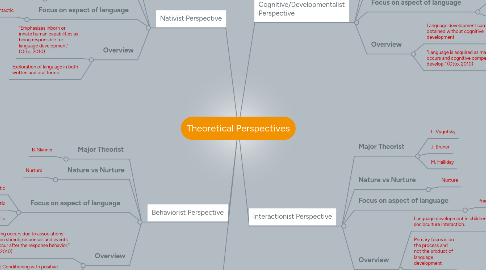
1. Nativist Perspective
1.1. Major Theorist
1.1.1. Noam Chomsky
1.2. Nature vs Nurture
1.2.1. Nature
1.3. Focus on aspect of language
1.3.1. Syntactic
1.4. Overview
1.4.1. "Emphasizes inborn or innate human capabilities as being responsible for language development" (Otto, 2010)
1.4.2. Exploration of language in both written and oral forms
2. Behaviorist Perspective
2.1. Major Theorist
2.1.1. B. Skinner
2.2. Nature vs Nurture
2.2.1. Nurture
2.3. Focus on aspect of language
2.3.1. Semantic
2.3.2. Syntactic
2.3.3. Morphemic
2.4. Overview
2.4.1. "Learning occurs due to associations between stimuli, responses and events that occur after the response behavior." (Otto, 2010)
2.4.2. Operant Conditioning with positive reinforcement increases the likelihood of repeated words by children
3. Reference
3.1. New nodeOtto, B. (2010). Language development in early childhood (3rd ed). Upper Saddle River, NJ: Merrill.
4. Cognitive/Developmentalist Perspective
4.1. Major Theorist
4.1.1. J. Piaget
4.2. Nature vs Nurture
4.2.1. Nature
4.3. Focus on aspect of language
4.3.1. Semantic
4.3.2. Morphemic
4.4. Overview
4.4.1. Language development can not be obtained without cognitive development
4.4.2. "Language is acquired as maturation occurs and cognitive competencies develop." (Otto, 2010)
5. Interactionist Perspective
5.1. Major Theorist
5.1.1. L. Vygotsky
5.1.2. J. Bruner
5.1.3. M. Halliday
5.2. Nature vs Nurture
5.2.1. Nurture
5.3. Focus on aspect of language
5.3.1. Pragmatic
5.4. Overview
5.4.1. Language development in children through socioculture interaction.
5.4.2. Primary focus is on the process and not the product of language development
5.4.3. "Children acquire language through their attempts to communicate with the world around them." (Otto, 2010)
